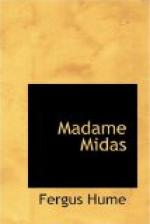At last the orchestra finished, and the curtain drew up, displaying an ancient house belonging to a decayed family. The young Squire, present head of the decayed family (Mr Cibber Wopples), is fighting with his dishonest steward (admirably acted by Mr Dogbery Wopples), whose daughter he wants to marry. The dishonest steward, during Act I, without any apparent reason, is struck with remorse, and making his will in favour of the Squire, departs to America, but afterwards appears in the last act as someone else. Leaving his will on the drawing-room table, as he naturally would, it is seized by an Eton boy (Master Sheridan Wopples), who hides it, for some unexplained reason, in the cruet-stand, being the last piece of family plate remaining to the decayed family. This is seized by a comic bailiff (Mr Theodore Wopples), who takes it to his home; and the decayed family, finding out about the will, start to chase the bailiff and recover the stolen property from him. This brought the play on to Act II, which consisted mainly of situations arising out of the indiscriminate use of doors and windows for entrances and exits. The bailiff’s mother-in-law (Mrs Wopples) appears in this act, and, being in want of a new dress, takes the cruet stand to her ‘uncle’ and pawns it; so Act II ends with a general onslaught of the decayed family on Mrs Wopples.
Then the orchestra played the ‘Wopples’ Waltz’, dedicated to Mr Theodore Wopples by Mr Handel Wopples, and during the performance of this Mr Villiers walked into the theatre. He was a little pale, as was only natural after such an adventure as he had been engaged in, but otherwise seemed all right. He walked up to the first row of the stalls, and took his seat beside a young man of about twenty-five, who was evidently much amused at the performance.
‘Hullo, Villiers!’ said this young gentleman, turning round to the new arrival, ‘what d’ye think of the play?’
‘Only just got in,’ returned Mr Villiers, sulkily, looking at his programme. ‘Any good?’ in a more amiable tone.
‘Well, not bad,’ returned the other, pulling up his collar; ’I’ve seen it in Melbourne, you know—the original, I mean; this is a very second-hand affair.’
Mr Villiers nodded, and became absorbed in his programme; so, seeing he was disinclined for more conversation, the young gentleman turned his attention to the ‘Wopples Waltz’, which was now being played fast and furiously by the indefatigable orchestra of two.
Bartholomew Jarper—generally called Barty by his friends—was a bank clerk, and had come up to Ballarat on a visit. He was well known in Melbourne society, and looked upon himself quite as a leader of fashion. He went everywhere, danced divinely—so the ladies said—sang two or three little songs, and played the same accompaniment to each of them, was seen constantly at the theatres, plunged a little at the races, and was altogether an extremely gay dog. It is, then, little to be




